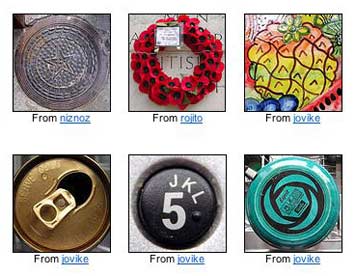
Detail from the Squared Circle Pool from Flickr, February, 2005.
The idea of social networking has always made me uneasy. To begin with, I'm not terribly social, and I don't exactly thrill to the idea of networking, either at bars or across an ethernet. I was never a big fan of collaborative filtering — the idea that just because I bought a cookbook on Amazon, I was instantly being targeted for every ergonomically correct onion slicer on the planet — and my opinion of user testing is only marginally cheerier than my view of market research. Basically, I cling to the notion of resistance, particularly when faced with the opposite: joining.
But Flickr has changed all that.
Flickr is a digital photo sharing website and web services suite that was developed by Ludicorp, a Vancouver, Canada company founded in 2002. It's a utopian oddity — a culture enabled by a technology that in turn enables a culture — and it's a brilliant example of socially networked software because it's free, its easy, and it makes sense. It also capitalizes on the great strengths of mobile computing, which is to say you can engage in all sorts of computational activities while being, well, mobile. Put simply, Flickr lets you upload photos, then helps you organize them, sequence them, post them, blog them, filter, edit and share them. In so doing, your photos become the conduit to other photos, and you "add contacts" (read "make new friends") through your pictures. And then — and here's the truly revolutionary part — you tag them, adding real suffixes that not only make sense to you but turn out to be rather functional where everyone else is concerned, too. The organizational groupings that follow (Flickr calls them "photo pools") come quite naturally from any of a number of shared interests — manhole covers (49 members), for instance, or squared circles (971 members) — but what emerges overall is a kind of anonymous, intoxicating curatorial energy. At the end of the day, Flickr is a robust, global resource born of random sightings and the many people eagerly willing to share them. And share they do.
These days, my skepticism about the current state of photography is mostly relegated to cameras which, despite being so captivatingly small, remain annoyingly enigmatic. Yet while I mourn the lack of a proper viewfinder on anything digital (a line in the sand, as far as I am concerned, that is tantamount to the end of civilization as we know it) I am equally taken with the idea of an image-driven community in which notions of territorial inequality are unheard of. Mary O'Hara's coming of age story about a young boy and his mercurial horse does indeed come to mind — and not only because Flicka sounds a lot like Flickr. Turns out that the horse in O'Hara's novel came from questionable bloodlines, which is to say he possessed a brilliance that could not be so easily traced. One might say the same about Flickr: sure, it's about social networking, and real-time interaction, and media-sharing, but it's also about the fundamental strength of pictures themselves as an international language, unbound by the normal exigencies of border and bias. In this view, it is decidedly more than the sum of its many glorious parts. And therein lies its genius.


Comments [9]
I don't want to convey the impression that I'm trying to attack you on a minor point; it just struck me oddly, that's all.
02.18.05
04:11
It should be pointed out that Flickr is only free in the sense of some television or radio. Which is to say that the free, and limited, option is subsidized by—as of this writing, fairly minimal—advertising. Given Flickr's (perma-)beta status, it's misguided to assume things will stay as is or to make definitive statements regarding cost. They claim there will always be free accounts(which I believe), but there's nothing said in particular about what that will entail.
LiveJournal, for example, has long had a free/pay split. But unless something has changed since I last read, paid accounts have access to additional, better supported, servers that free accounts don't. If there's downtime and you're not paying, you simply have to wait. On the other hand, there's no advertising anywhere. Paid accounts also gain some additional features, a practice which Flickr has already adopted.
02.19.05
01:00
02.21.05
10:38
02.21.05
12:05
02.21.05
12:18
Now a bit of a plug, since you've stumbled upon one of my pet enthusiasms; do also have a look at
AudioScrobbler - a service that logs what music you play in iTunes or whatever and provides personalised online radio and reccomendations based upon others with similar tastes. I know this is an extrapolation of the amazon thing, and may not be to everyone's taste, but the wonderful thing is that it is entirely transparent; it works away in the background invisibly, until such a time as you wish to take a look at the information produced. You don't have to do explicitly 'make friends' with other users either. If you listen to a lot of music, it's definately worth playing with, even if not for long.
However, the holder of the social software crown in my estimation has to be del.icio.us - for those who don't hang around in more nerdy weblog circles, a 'social bookmark manager' which allows you to quickly and effortlessly bookmark web pages, and add descriptive 'tags'(like flikr) to them, adding them to a huge online directory of all the pages people have bookmarked, searchable by user or tagged words. Even if you don't want to post to it, it's a great resource for any kind of web based research.
Oh, and one final thing....
why not set up a designobserver.com photoblog on flickr? this could be integrated into the DO site using RSS, and contributors (and even readers!) could post images of interest via email. Just a thought, anyway.
02.22.05
08:53
Within a day I had exceeded my free upload limit and needed to buy a larger account. I wasn't planning to do that much uploading but have found myself back almost everyday. Keep in mind it's only been nine days so far In the days that I've been uploading, the experience has been great. Not only for the positive feedback from others but for the opportunity to see images taken from people all around the world. It seems fairly open ended and scalable to the needs of the creatives that use it.
Like Tim mentioned, I'd be interested in seeing a designobserver.com photoblog on flickr too if one hasn't already been set up.
02.27.05
06:25
Don't forget that you can search for photos on flickr by their respective Creative Commons licences. This is helpful if you're on a low budget but still need creative and engaging photography.
It seems that everywhere I turn (CommArts, here, TechTV), there's always some great piece of promotion for them (which is good, because I'm getting tired of telling everyone I've ever met about Flickr).
02.28.05
05:42
07.07.05
11:04